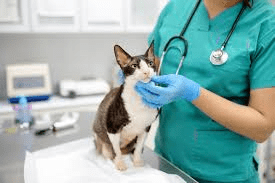Veterinary care is a vital part of ensuring that animals remain healthy and happy. Just like humans, animals need regular check-ups, vaccinations, and sometimes emergency care to maintain their well-being. Whether you are a pet owner, a farmer, or simply someone who loves animals, understanding the basics of veterinary care is essential.
This article will provide you with a comprehensive guide to veterinary care, covering essential practices, what every pet owner should know, and the importance of regular check-ups.
Comprehensive Guide to Veterinary Care of Animals
Veterinary care involves a range of practices and services designed to keep animals healthy. These include preventive care, diagnosis and treatment of illnesses, surgical procedures, and emergency care. Here’s a breakdown of the key aspects:
1. Preventive Care: This is the foundation of veterinary medicine. Preventive care includes vaccinations, regular check-ups, and dental care. By preventing diseases before they start, you can help your pet or livestock live a longer, healthier life.
2. Diagnosis and Treatment: If an animal becomes sick or injured, a veterinarian will diagnose the problem and recommend the best course of treatment. This might include medication, therapy, or surgery.
3. Surgical Procedures: Some health issues require surgery. This could range from routine procedures like spaying and neutering to more complex operations such as tumor removal.
4. Emergency Care: In cases of severe injury or sudden illness, emergency veterinary care is crucial. This care is available 24/7 and can save an animal’s life.
5. Nutrition and Diet: Proper nutrition is vital for an animal’s health. Veterinarians can provide guidance on the best diet for your pet or livestock, depending on their species, age, and health condition.
6. Parasite Control: Regular treatment to prevent parasites like fleas, ticks, and worms is essential. These parasites can cause significant health issues if not controlled.
Essential Veterinary Care Practices for Healthy Animals

To ensure your animals stay healthy, it’s important to follow essential veterinary care practices. Here’s what you need to know:
1. Regular Check-ups: Schedule regular veterinary visits for your animals. These check-ups help detect health problems early and ensure that vaccinations are up to date.
2. Vaccinations: Vaccinations protect animals from common diseases. Make sure your pets or livestock receive their vaccinations on schedule.
3. Dental Care: Oral health is often overlooked but is crucial for overall well-being. Regular dental cleanings and checks can prevent tooth decay and gum disease.
4. Proper Nutrition: Feed your animals a balanced diet suitable for their species and age. Consult with a veterinarian to ensure they are getting the right nutrients.
5. Parasite Prevention: Use recommended treatments to prevent parasites. This includes regular deworming and the use of flea and tick preventatives.
6. Exercise and Enrichment: Animals need physical activity and mental stimulation. Ensure they get enough exercise and have toys or activities to keep them engaged.
7. Spaying and Neutering: Consider spaying or neutering your pets to prevent overpopulation and reduce the risk of certain health issues.
8. Monitoring Behavior: Keep an eye on your animal’s behavior. Changes in behavior can be an early sign of health problems. If you notice anything unusual, consult a veterinarian.
Veterinary Care for Animals: What Every Pet Owner Should Know
As a pet owner, there are specific things you should know to provide the best care for your animals:
1. Know Your Pet’s Needs: Every animal has different needs. Learn about the specific requirements of your pet’s breed, species, and age.
2. Establish a Veterinary Relationship: Build a relationship with a trusted veterinarian. They will become familiar with your pet’s health history and can provide better care.
3. Understand Emergency Signs: Learn the signs of a medical emergency, such as difficulty breathing, vomiting, or sudden lethargy. Knowing when to seek immediate help can save your pet’s life.
4. Budget for Veterinary Care: Veterinary care can be expensive, especially in emergencies. Plan and budget for routine care and unexpected costs.
5. Learn Basic First Aid: Knowing basic first aid for animals can be incredibly helpful in emergencies. Learn how to stop bleeding, perform CPR, and handle other common issues.
6. Keep Records: Maintain detailed records of your pet’s health, including vaccination dates, medical history, and any treatments they have received. This information is useful for your veterinarian.
Read Also: 5 Medicinal Health Benefits Of Yucca glauca (Soapweed Yucca)
Understanding Veterinary Care: Ensuring Animal Health and Wellbeing

Veterinary care is more than just treating illnesses; it’s about ensuring overall health and well-being. Here’s how to ensure your animals are well cared for:
1. Holistic Approach: Take a holistic approach to your animal’s health. This means considering all aspects of their well-being, including physical health, mental health, and environmental factors.
2. Regular Health Assessments: Regular assessments by a veterinarian can help catch potential health problems early, before they become serious.
3. Mental Health: Animals can experience stress, anxiety, and depression, just like humans. Provide a safe, comfortable environment and plenty of social interaction.
4. Environmental Enrichment: Animals need stimulation to stay mentally healthy. Provide toys, social interactions, and a stimulating environment.
5. Disease Prevention: Follow recommended guidelines for vaccinations and parasite control to prevent diseases. Prevention is always better than cure.
6. Quality of Life: Focus on improving your animal’s quality of life. This includes providing proper nutrition, regular exercise, and plenty of love and attention.
The Importance of Regular Veterinary Care for Animals
Regular veterinary care is crucial for the long-term health and happiness of your animals. Here’s why it’s important:
1. Early Detection of Health Issues: Regular check-ups help catch health issues early, making treatment easier and more effective.
2. Vaccination Updates: Regular visits ensure that vaccinations are up to date, protecting your animals from preventable diseases.
3. Nutritional Guidance: Veterinarians can provide advice on proper nutrition, helping you avoid common diet-related health issues.
4. Parasite Control: Regular veterinary care includes parasite prevention, which is essential for keeping your animals healthy and free from harmful parasites.
5. Behavioral Insights: Vets can offer insights into behavioral issues and suggest ways to address them, improving your pet’s quality of life.
6. Longevity: Animals that receive regular veterinary care tend to live longer, healthier lives. Preventive care and early treatment are key to a long life.
7. Peace of Mind: Regular check-ups give you peace of mind, knowing that your animals are healthy and well-cared-for.
Veterinary Care of Animals: A Step-by-Step Guide for Beginners
Veterinary care is essential for maintaining the health and well-being of animals, whether they are pets, livestock, or wildlife. For beginners, understanding how to properly care for animals can seem overwhelming. This step-by-step guide will help you navigate the basics of veterinary care, ensuring that your animals receive the best possible treatment.
1. Choose the Right Veterinarian: The first step in veterinary care is finding a qualified and trustworthy veterinarian. Look for someone who specializes in the type of animal you have, whether it’s a dog, cat, horse, or livestock. Establishing a relationship with a vet is crucial for regular check-ups and emergency situations.
2. Schedule Regular Check-Ups: Regular veterinary visits are essential for detecting health issues early. During these check-ups, the vet will perform physical exams, administer vaccinations, and provide advice on diet and exercise.
3. Vaccinations: Ensure your animals are vaccinated according to the recommended schedule. Vaccinations protect against common diseases and are a crucial part of preventive care.
4. Parasite Control: Implement a parasite control plan that includes regular deworming and treatments for fleas, ticks, and other parasites. Your vet can recommend the best products and schedule for your animals.
5. Nutrition: Provide a balanced diet that meets the specific nutritional needs of your animals. Consult your veterinarian to create a diet plan that promotes growth, health, and longevity.
6. Dental Care: Regular dental care is vital for preventing oral diseases that can affect overall health. This includes brushing teeth, providing dental chews, and scheduling professional cleanings if necessary.
7. Exercise and Enrichment: Ensure your animals receive adequate physical exercise and mental stimulation. This helps prevent obesity, boredom, and related health issues.
8. Emergency Preparedness: Be prepared for emergencies by having a first aid kit, knowing basic first aid, and having your veterinarian’s contact information readily available.
Read Also: 17 Medicinal Health Benefits Of Saffron (Crocus sativus)
Key Veterinary Care Procedures for Animal Health Maintenance

Proper veterinary care involves several key procedures that help maintain the health of animals. Here’s what you need to focus on:
1. Physical Exams: Regular physical exams allow veterinarians to assess an animal’s overall health, identify potential problems, and recommend preventive measures.
2. Vaccination Programs: Vaccines are vital for preventing infectious diseases. Follow your vet’s recommended vaccination schedule for your animals.
3. Spaying and Neutering: These surgical procedures prevent unwanted breeding and can reduce the risk of certain health issues, including cancers and behavioral problems.
4. Microchipping: Microchipping is a simple procedure that provides a permanent form of identification for your pet, making it easier to reunite with them if they get lost.
5. Routine Blood Work: Regular blood tests help monitor your animal’s internal health, detecting issues like kidney or liver disease before symptoms appear.
6. Grooming: Regular grooming, including brushing, bathing, and nail trimming, is important for an animal’s hygiene and comfort. Grooming also allows for early detection of skin issues or parasites.
7. Reproductive Health: Regular veterinary checks are essential for breeding animals to ensure they are healthy enough for reproduction and to manage any complications that may arise.
8. End-of-Life Care: When an animal reaches the end of its life, veterinary care can help manage pain and ensure a peaceful passing. Discuss options like hospice care or euthanasia with your vet when necessary.
Veterinary Care Essentials: Keeping Your Animals Healthy and Safe
Veterinary care is the cornerstone of keeping animals healthy and safe. Here are the essentials every animal owner should follow:
1. Regular Health Checks: Regular check-ups help in early detection of diseases and allow for timely treatment. Make sure your animals visit the vet at least once a year.
2. Proper Diet: Feeding your animals the right food is crucial for their health. A balanced diet tailored to their age, size, and activity level is essential.
3. Clean Living Environment: Maintain a clean living environment for your animals. Regular cleaning reduces the risk of infections and ensures a healthy habitat.
4. Hydration: Always provide fresh, clean water. Dehydration can lead to serious health issues, so make sure your animals have constant access to water.
5. Regular Exercise: Encourage regular exercise to keep your animals fit and healthy. Exercise helps prevent obesity, strengthens muscles, and improves overall well-being.
6. Mental Stimulation: Provide toys, activities, and social interaction to keep your animals mentally stimulated. Boredom can lead to destructive behavior and mental health issues.
7. Safety Precautions: Ensure your animals are safe from hazards. This includes securing their living areas, using collars with ID tags, and supervising them during outdoor activities.
8. Emergency Care Knowledge: Educate yourself on basic first aid and emergency care for your animals. This knowledge can be lifesaving in critical situations.
Practical Veterinary Care Tips for Animal Owners
For animal owners, practical veterinary care tips are invaluable for maintaining the health and well-being of their animals. Here’s what you need to know:
1. Develop a Care Routine: Establish a daily routine that includes feeding, exercise, and grooming. Consistency helps animals feel secure and healthy.
2. Monitor Health: Keep an eye on your animal’s behavior, appetite, and physical condition. Early signs of illness include changes in eating habits, lethargy, or unusual behaviors.
3. Keep Vaccination Records: Maintain accurate records of vaccinations, treatments, and veterinary visits. This helps track your animal’s health history and ensures timely care.
4. Prevent Obesity: Monitor your animal’s weight and adjust their diet and exercise routine as needed to prevent obesity, which can lead to other health problems.
5. Learn to Read Labels: When buying food, treats, or medication, learn to read and understand labels. Choose products that are appropriate for your animal’s age, size, and health condition.
6. Use Preventatives: Regularly use flea, tick, and worm preventatives as recommended by your vet. Parasites can cause severe health problems if not controlled.
7. Create a Comfortable Environment: Ensure that your animal’s living space is comfortable and safe. Provide bedding, clean water, and access to outdoor spaces when appropriate.
8. Regular Grooming: Regular grooming not only keeps your animals clean but also allows you to check for any unusual lumps, bumps, or skin issues.
Veterinary Care Fundamentals: Ensuring the Wellbeing of Your Animals
Understanding the fundamentals of veterinary care is crucial for ensuring the well-being of your animals. Here’s how you can provide the best care:
1. Commit to Lifelong Care: Veterinary care is a lifelong commitment. Regular check-ups, proper diet, and preventive care are essential from the time your animal is a baby until they are elderly.
2. Understand Animal Behavior: Learn about your animal’s natural behaviors and instincts. Understanding what is normal can help you spot when something is wrong.
3. Stay Informed: Keep yourself updated on veterinary care practices. This includes new vaccines, treatments, and recommendations for your specific type of animal.
4. Socialization: Proper socialization is important, especially for pets. Expose them to different environments, people, and animals to reduce anxiety and behavioral issues.
5. Adapt Care to Life Stages: As your animals age, their care needs will change. Work with your vet to adjust their diet, exercise, and health checks according to their life stage.
6. Preventive Care: Invest in preventive care, including vaccinations, parasite control, and regular screenings. Prevention is the best way to ensure long-term health.
7. Emergency Plans: Have an emergency plan in place, including a list of contacts for emergency veterinary services and basic first aid supplies.
8. Love and Attention: Finally, give your animals plenty of love and attention. A strong bond with their owner is vital for an animal’s mental and emotional well-being.
Conclusion
Veterinary care is essential for the health and well-being of animals. By following these step-by-step guides, key procedures, and practical tips, you can ensure that your animals receive the best possible care. Remember, regular veterinary visits, proper nutrition, and a safe environment are the cornerstones of a healthy and happy animal. Whether you are a new pet owner or have been caring for animals for years, staying informed and committed to their care is crucial.
Read Also: How to Grow Tomatoes in Containers






